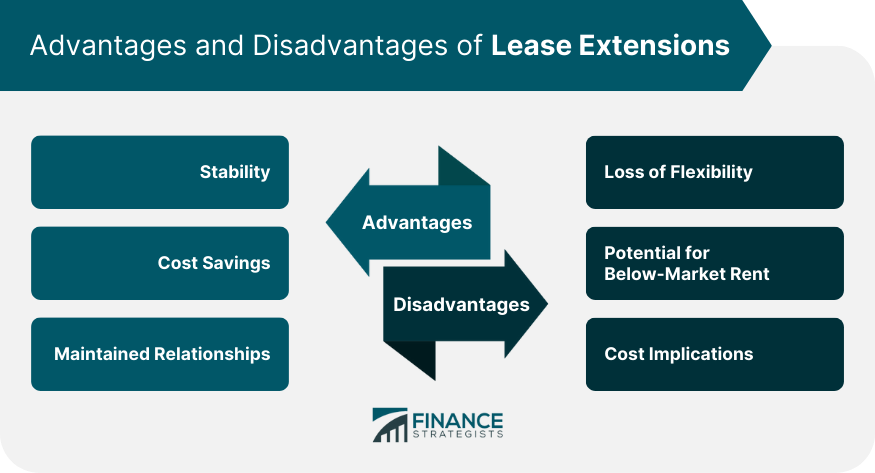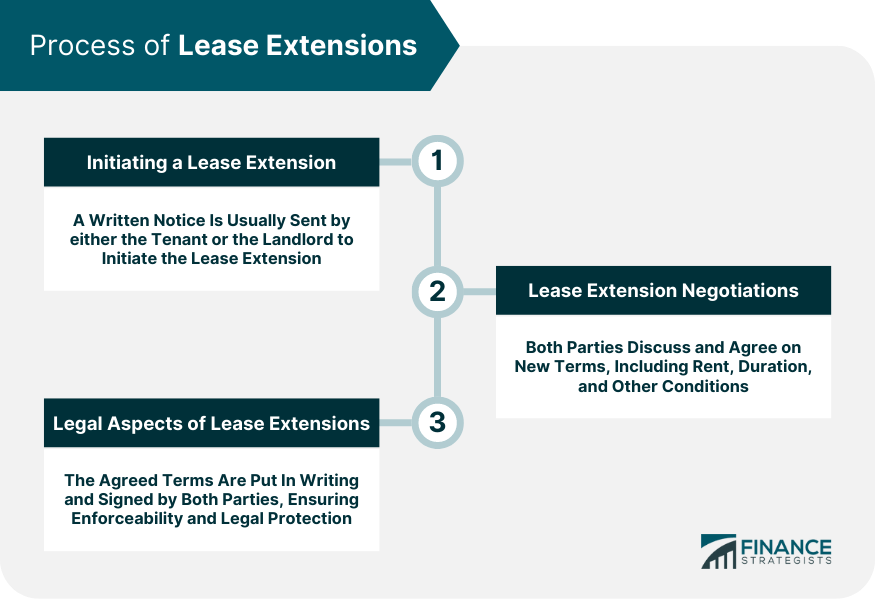A lease extension, also known as a lease renewal, is a prolongation of the existing lease agreement between a landlord and tenant for a specific time. This arrangement sustains the tenancy under the original contract's terms, providing convenience and continuity by eliminating the need for a new lease agreement. It plays a vital role in both residential and commercial landlord-tenant relationships, preserving the tenure and financial stipulations of the tenancy. Understanding lease extensions is crucial as they influence arrangements for residential or business premises, particularly for tenants planning a prolonged stay or businesses seeking location stability. Additionally, lease extensions offer mutual benefits: tenants may avoid relocation costs and maintain a preferred location, while landlords secure steady income without the need to find new occupants. Stability: One of the main advantages of a lease extension is the provision of stability for both tenant and landlord. Tenants can remain in a location they're comfortable with, while landlords continue to receive a regular income. Cost Savings: Lease extensions can result in substantial cost savings, especially for tenants. Moving costs, both financial and non-financial, are avoided, and there's no need to spend time and money searching for a new place. Maintained Relationships: A lease extension allows for the continuation of a good landlord-tenant relationship. Trust and mutual understanding built over time can contribute to a more harmonious leasing experience. Loss of Flexibility: Extending a lease can restrict flexibility. Tenants may find themselves tied to a property, limiting their ability to move for work or lifestyle changes. Landlords might also be bound to tenant or lease terms that become less favorable over time. Potential for Below-Market Rent: If property prices increase significantly during the lease period, landlords might find themselves receiving below-market rent after a lease extension, especially if rent adjustment clauses aren't included in the lease. Cost Implications: While there can be cost savings, there might also be added costs associated with a lease extension. For example, in leasehold properties, tenants may need to pay a premium for the extension. There could also be legal and administrative fees. Extending a lease isn't always straightforward. It involves a process that can differ depending on the specifics of the existing lease agreement and the jurisdiction's legal framework. Typically, either the landlord or the tenant can initiate a lease extension. The process often starts with a written notice indicating the intent to extend the lease and the initial terms for the extension. These negotiations involve both parties agreeing on the terms of the lease extension, including rent, duration, and other stipulations. These discussions can be straightforward or complex, depending on the parties' goals and the property's circumstances. Once an agreement is reached, the lease extension should be put in writing and signed by both parties. This ensures that the new terms are enforceable, providing legal protection for both parties. Several factors can influence the process and outcomes of lease extensions. These include market conditions, property type, location, and the relationship between the tenant and landlord. Prevailing market conditions can heavily influence lease extension negotiations. For instance, in a landlord's market with high demand and low supply, landlords might be less inclined to extend a lease at the current rate. The property's characteristics, including its type (e.g., residential, commercial, industrial) and location, also factor into lease extension considerations. A prime location or desirable property type may result in more favorable terms for the landlord. The tenant-landlord relationship also plays a significant role. A tenant with a good track record of timely payments and property care is more likely to receive favorable lease extension terms. Lease extensions not only impact the immediate parties but also bear on property values, particularly in the context of leasehold properties. In the case of leasehold properties, a longer lease generally increases property value. Potential buyers often view short leases as risky, meaning a lease extension can enhance a property's appeal and market value. The valuation of a leasehold extension can be complex, involving various factors like the unexpired lease term, ground rent, and the property's "marriage value." Specialist surveyors often conduct this valuation. There are various costs associated with lease extensions that both tenants and landlords need to consider. These costs may include legal fees, valuation fees, and, in the case of leasehold properties, the premium payable to the freeholder. Furthermore, if the rent or other terms change, these adjustments may also bear financial implications. These options can range from personal savings and bank loans to more specialized financing options, such as lease extension loans. Each comes with its own set of pros and cons, requiring careful consideration. In many jurisdictions, tenants of leasehold properties have a legal right to extend their lease under certain conditions. Simultaneously, they also have obligations, such as paying the agreed-upon extension premium. Property law often guides the lease extension process, from the tenant's right to request an extension to the valuation method for the extension premium. An understanding of this law is crucial for both parties. Lease extensions play a pivotal role in the real estate sector, offering stability, cost savings, and continuation of positive landlord-tenant relationships. While they introduce certain limitations, like reduced flexibility and potential below-market rent, the overall benefits can outweigh the negatives. The lease extension process requires negotiations and legal considerations to safeguard both parties interests. Factors like market conditions, property type, and location, along with tenant-landlord relationships, significantly impact lease extensions. The extensions also influence property values, especially in the context of leasehold properties, generally enhancing property appeal and market worth. Legal and financial aspects cannot be overlooked, given their relevance in defining rights, obligations, and financial implications. Understanding lease extensions, their pros and cons, and related factors is crucial for effective property management, tenancy sustainment, and real estate investment.Lease Extension Overview
Advantages of Lease Extensions
Disadvantages of Lease Extensions

Process of Lease Extensions
Initiating a Lease Extension
Lease Extension Negotiations
Legal Aspects of Lease Extensions

Factors Impacting Lease Extensions
Market Conditions
Property Type and Location
Tenant and Landlord Relationship
Lease Extension and Property Value
Impact of Lease Extension on Property Value
Leasehold Extension Valuation
Financial Implications of Lease Extensions
Cost of Lease Extension
Funding Options for Lease Extensions
Legal Aspects of Lease Extensions
Legal Rights and Obligations
Lease Extension Under Property Law
Conclusion
Lease Extension FAQs
Lease extensions can have a significant impact on property value, especially for leasehold properties. Generally, a longer lease term increases the value of a leasehold property, as potential buyers often perceive short leases as risky.
The costs associated with lease extensions can include legal fees, valuation fees, and potentially a premium payable to the freeholder for leasehold properties. Changes in rent or other terms may also lead to additional financial implications.
Several factors can influence lease extensions. These include prevailing market conditions, the type and location of the property, and the relationship between the tenant and landlord. All these factors can play a role in lease extension negotiations and outcomes.
The legal framework often guides the process of lease extensions, from the tenant's right to request an extension to the method of calculating the extension premium. Laws vary by jurisdiction, making it crucial for both tenants and landlords to understand their legal rights and obligations.
Yes, there are many resources available to assist with lease extensions. These include online resources, books, and legal advice services. They can provide additional insights into the complexities of lease extensions, helping tenants and landlords make informed decisions.
True Tamplin is a published author, public speaker, CEO of UpDigital, and founder of Finance Strategists.
True is a Certified Educator in Personal Finance (CEPF®), author of The Handy Financial Ratios Guide, a member of the Society for Advancing Business Editing and Writing, contributes to his financial education site, Finance Strategists, and has spoken to various financial communities such as the CFA Institute, as well as university students like his Alma mater, Biola University, where he received a bachelor of science in business and data analytics.
To learn more about True, visit his personal website or view his author profiles on Amazon, Nasdaq and Forbes.











